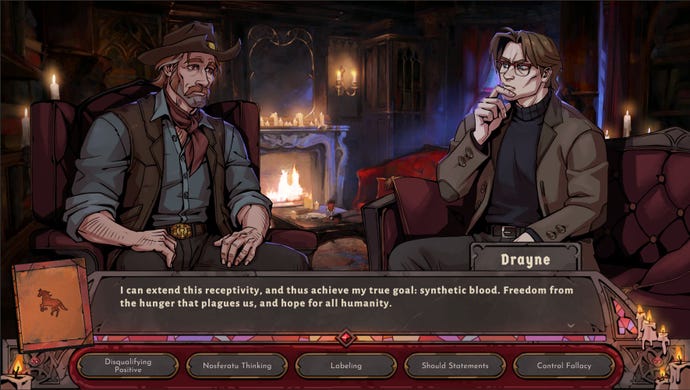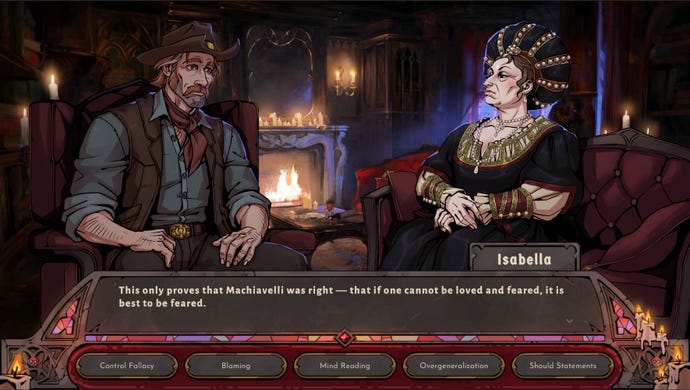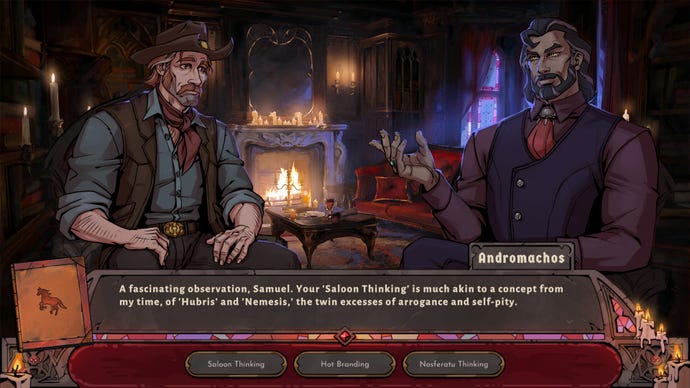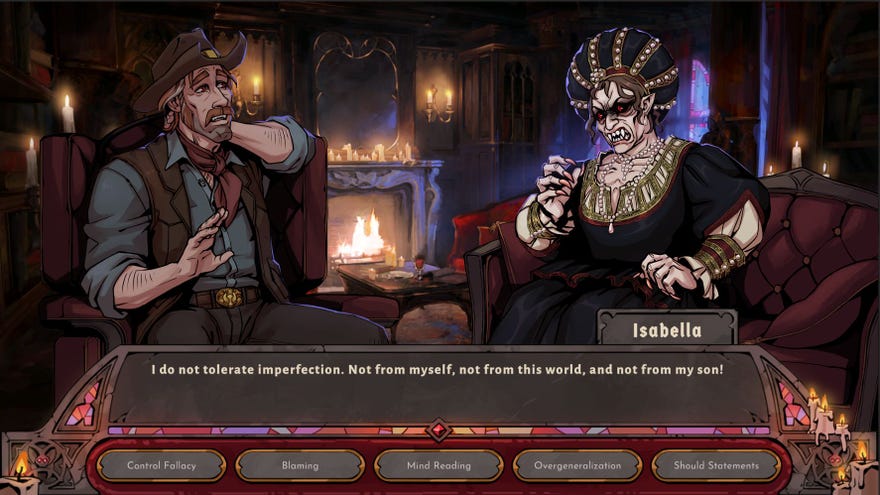How Mel Brooks and Twilight inspired a vampire visual novel mixing funny with therapy
Little Bat Games' creative director talks through our feelings on Vampire Therapist
After writing about the upcoming visual novel-ish game Vampire Therapist (in which you are a vampire, acting as a therapist to other vampires) back in the middle of January, developer Cyrus Nemati reached out asking if I'd like to ask him more questions about it. This was surprising, because while I'd been broadly positive about the vibes of Vampire Therapist, I was reasonably concerned about the specifics of how it would all shake down. But it turned out that the critical perspective was something Nemati appreciated, and so we had a chat that dug down into the meat of it all. Although I was initially interested in how he'd come up with the idea of a vampire therapist, it turns out all roads lead back to Twilight's Edward Cullen.
"The problem with Twilight - there are a few - [is that] there's a scene where Edward starts playing the piano, and he's supposed to be really good, because it's been 200 years," Nemati tells me over a call from his home in Germany. "And he's not... he's not that good. But then I thought, 'Why should he be good just because he has had 200 years?'"
This got Nemati thinking about how vampires are portrayed across media more generally: they act sexy, they drink blood, they kill people, but they don't really do anything. "But it's a lot of pressure to say, why not go to Mars? Why not go to the bottom of the ocean? Why not cure cancer? Write the greatest novel of all time? It's a lot of pressure on a vampire!" I can see where he's coming from, given that I, with my wild and precious life that's considerably more limited in scope than a vampire's, have trouble finding the motivation to get off the sofa.

Nemati is both the creative director of Little Bat Games and a voice actor you'll have heard in games such as Hades, and it was his experiences with the latter that led him to making Vampire Therapist a fully-voiced game. It was a "fairly critical" decision, Nemati says, partly because it's fun, but also because the voice acting helps the audience feel the characters' emotions. It's also a choice that stems from one of Nemati's other main inspirations: introspective comedy.
"I grew up on a lot of Mel Brooks-style humour, which talks about humour in a particular way," he explains. "It's irreverant, I would say, towards history, and I wanted to have a lot of that irreverence to it when dealing with vampires." His favourite vampire story specifically is What We Do In The Shadows - albeit the movie, not the TV show. He also cites Shadow Of The Vampire, because "it dealt with more of the practical mortal/vampire interaction concerns in a pseudo-serious way." He also "got a lot from the surprisingly verbose and well-researched Encylopedia Of Vampire Mythology."
As such, it seems like Vampire Therapist will have a lighter tone than you might think - the old 'tragedy plus time equals comedy' equation - as Nemati says the game's humour will be "front and centre". Earlier on in development, the player character was going to be a 3000-year-old blood sucker named Andromachos, who ended up "sucking the humour out of the room - like, he was too old and too wise," according to Nemati. Now you play as Sam, a cowboy vampire who's much younger and more approachable than Andromachos, and who can learn the concepts of in-game therapy along with the player. At the same time, Sam can be framed as having a decent historical head start on introspection over other vampires, from having been rescued by Transcendentalists and spending decades walking in the woods with naturalist John Muir doing accidental mindfulness.
Sam's in-game therapy practices involve pointing out thought distortions in his clients so they become more aware of them, an idea based on real-life Cognitive Behavioural Therapy (CBT). If you've gone to your NHS doctor and asked for help with your mental health, for example, you were probably referred for CBT. It's quick, practical, and is applied to a bunch of different mental health disorders. Nemati says he chose CBT as a model partly because "it's definitely the most studied form of mental health treatment", so there's a lot of credentialing behind it, and a lot of resources to draw on. It was also something that could be standardised and applied to a game. Nemati worked with a therapist counsel to come up with a number of thought distortions for the game that "were clean, clear, [and] had been in use for a long time."
"We're trying to look at it as one tool that can be used," he continues. "Normally in therapy, there are a number of tools that you use. Cognitive Behavioural Therapy is just one that's meant for addressing the distortions themselves, not for trauma-processing."

Of course, CBT has long had its critics; it focuses on stopping harmful thought patterns in the present, rather than addressing the reasons those patterns might exist in the first place. It's an interesting idea to apply to vampires, whose present is very much outweighed by their past, but Nemati says the vampires in the game have the same sorts of distortions as mortals - they're just much more deeply entrenched. "I'm sure it's good for the vampires as well to be aware. That's all I'm looking for, is awareness. Not the idea that this is some sort of cure all - because certainly it's not."
Nemati also addressed my concern that the specific therapy terms are mixed up with both vampiric and cowboy-themed ones, when Sam is treating people. He says these are analogies that disappear pretty quickly. 'Nosferatu thinking', for example, is a little joke referencing 'black-and-white thinking' (what with Nosferatu being a black and white film and all). Rather, the core of the game is to really share the idea that if you're living (or un-living) in this world, therapy is for everyone. "Whether you're 20 or 2000, you can use therapy," Nemati says, "so it's not to recommend a particular modality."
Framing the game around vampires also allows Nemati to get historical, touching on a range of topics and problems from across the ages. You meet a 17th century doctor, for example, as well as a woman named Isabella who was a patron to Da Vinci and Michelangelo. "She has a lot to say about the state of arts in the modern day, and about family and about control," Nemati tells me. "Then I've got a Bronze Age character who's more from a tribal society and decides to become an internet streamer, because she doesn't want to leave the house."

It makes some of the issues that come up easier to talk about, which given the size of the content warning on the game, look to be plentiful. Nemati thinks he possibly didn't need to make it quite as comprehensive as it is, though he does stand by it. "The nice part about history is that these things happened a long time ago - things like war or death - they've been [around] a very long time, and [the vampires] internalised them in their own ways, be they healthy ways or not."
This is also where we get back to comedy. Nemati notes that humour has always been a diffuser for talking about difficult topics. "When things happened a long time ago, even if they were traumatic for a vampire at the time, they make jokes about it," he says. "I mean, this is something humans do all the time; they go through a traumatic experience, and, you know, they get some laughs out of it, because what the hell else can you do?"
This makes sense to me. Nemati also drops in that sometimes you'll comment on how a character is actually deflecting with humour, which also makes a lot of sense to me. At other times, the issue will be around a vampire struggling with how they think a vampire should be or behave. "The doctor vampire I have, he doesn't want to be a vampire," Nemati says. "He doesn't like vampires. He thinks they're horrible, and so he basically wants to cure himself of his own identity." It is interesting, I think, to consider what is a healthy way of thinking for a vampire, right? Is it 'normal' for a vampire to hate being a vampire, or to be okay with it? How 'should' a vampire feel about murder and drinking blood?
"Every vampire is going to have a different journey. And there are vampires from older societies that are going to think differently from newer vampires," says Nemati. "So just like mortals, they do a lot of judging of themselves and of others." Which, neatly, reminds me of Edward Cullen again. If ever a vampire needed therapy, right?
Vampire Therapist, which I now feel considerably more confident about, is coming to Steam later this year.









